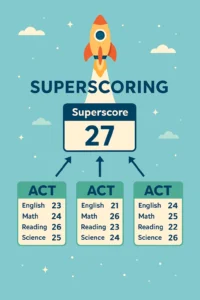When preparing for the ACT, the first question many students ask is “what’s on the ACT?” Understanding the structure, content areas, and types of questions across all ACT subjects is crucial to building an effective study plan. The more familiar you are with the test blueprint, the better your performance will be on test day.
This article, brought to you by Open Future, provides a complete breakdown of the ACT exam, covering each section, its content, and common ACT question types—helping you prepare with clarity and confidence.
Overview: Why You Need to Know What’s on the ACT
The Power of Understanding Test Structure
Knowing what’s on the ACT allows you to eliminate guesswork and focus your prep time on the areas that matter most. The ACT is divided into four main ACT subjects: English, Math, Reading, and Science. Each section has its own question formats, timing rules, and scoring methods.
By breaking down the test and identifying the most common ACT question types, you’ll be able to allocate your study time wisely. More importantly, you’ll reduce test-day anxiety because you’ll walk in knowing exactly what to expect.
Strategic preparation starts with deep familiarity—what’s on the ACT isn’t a mystery once you understand the layout and intent behind each section.
Section Breakdown: English, Math, Reading, and Science
ACT English Section
The English section consists of 75 questions to be completed in 45 minutes. Questions are based on five passages and focus on:
- Grammar and usage
- Sentence structure
- Strategy
- Organization
- Style
You’ll be tested on punctuation, verb usage, pronouns, modifiers, and rhetorical skills. Among the ACT question types here, expect sentence corrections and questions that ask you to improve or reorganize information.
ACT Math Section
The Math section includes 60 questions to be completed in 60 minutes. The content covers:
- Algebra I and II
- Geometry
- Trigonometry
- Arithmetic
Questions are multiple-choice, and calculator use is permitted. Common ACT question types include word problems, equations, functions, and graph interpretation.
This section heavily represents the technical side of ACT subjects, and a clear understanding of concepts—not just formulas—is key.
ACT Reading Section
This section includes 40 questions in 35 minutes, divided among four passages. Topics are drawn from:
- Prose fiction/literary narrative
- Social science
- Humanities
- Natural science
You’ll need to analyze passages and answer questions about main ideas, details, inferences, and vocabulary in context. Understanding ACT question types in reading will help you spot distractors and read more efficiently.
ACT Science Section
The science section also includes 40 questions in 35 minutes and tests your ability to interpret data, scientific analysis, and evaluate hypotheses. Despite the name, it’s not about memorizing facts but analyzing graphs, charts, and experiment descriptions.
This section combines multiple ACT question types, including those based on conflicting viewpoints and data representation.
How to Study for Each Section Efficiently
Focused Prep for Maximum Impact
Now that you know what’s on the ACT, let’s talk strategy. Preparing for the test means more than just reviewing content—it’s about understanding how questions are presented and how to manage your time.
For expert help, enroll in our customized test prep programs at Open Future, where we teach students how to master each section with targeted practice and professional guidance.
You can also use tools like this plan study guide to organize your short-term review. Whether you’re days or months away from the test, efficient preparation starts with knowing ACT subjects in detail.
In your study sessions:
- Review official ACT sample questions to understand real ACT question types.
- Time yourself on practice sections.
- Identify which content areas (e.g., coordinate geometry, punctuation) need the most attention.
Why Knowing Question Types Makes a Difference
Pattern Recognition Leads to Faster Answers
Identifying ACT question types is just as important as knowing the content. Most questions follow specific patterns—especially in English and Reading—so if you’ve seen the pattern before, your brain can respond faster.
Some examples:
- English: “Which version is most concise?” appears regularly.
- Math: Function substitution questions are common.
- Reading: “The author suggests that…” is a frequent phrasing.
Recognizing these common formats across ACT subjects helps you skip unnecessary re-reading and focus directly on what’s being asked.
Practicing with this awareness boosts your efficiency, accuracy, and confidence—and helps you spend more time on challenging questions that really matter.
Final Thoughts: Know What’s Coming, Beat the Test
Ultimately, understanding what’s on the ACT is the foundation of effective test prep. When you know the content breakdown, timing rules, and ACT question types, you can study smarter and perform better.
Whether you’re focused on acing the math section or improving your reading speed, preparation becomes less stressful once the unknowns are removed. Leverage professional guidance from Open Future, and consider integrating techniques from plan study tools to keep your learning on track.
Start with knowing what’s on the ACT, and the rest of your journey becomes much more manageable.
FAQs: Understanding ACT Content and Format
1. What are the main ACT subjects tested?
The ACT includes English, Math, Reading, and Science. Each section targets different academic skills.
2. How many types of questions are on the ACT?
There are multiple ACT question types, including grammar correction, math equations, data analysis, and reading comprehension.
3. Is the science section really about science knowledge?
No. It’s about interpreting graphs, analyzing data, and understanding experiments—scientific reasoning over facts.
4. Why should I learn the test structure?
Understanding what’s on the ACT helps you allocate time and study effort efficiently.
5. Where can I find professional prep help for all ACT subjects?
You can sign up for expert-led sessions at Open Future’s test prep page and explore study strategies like plan study.



